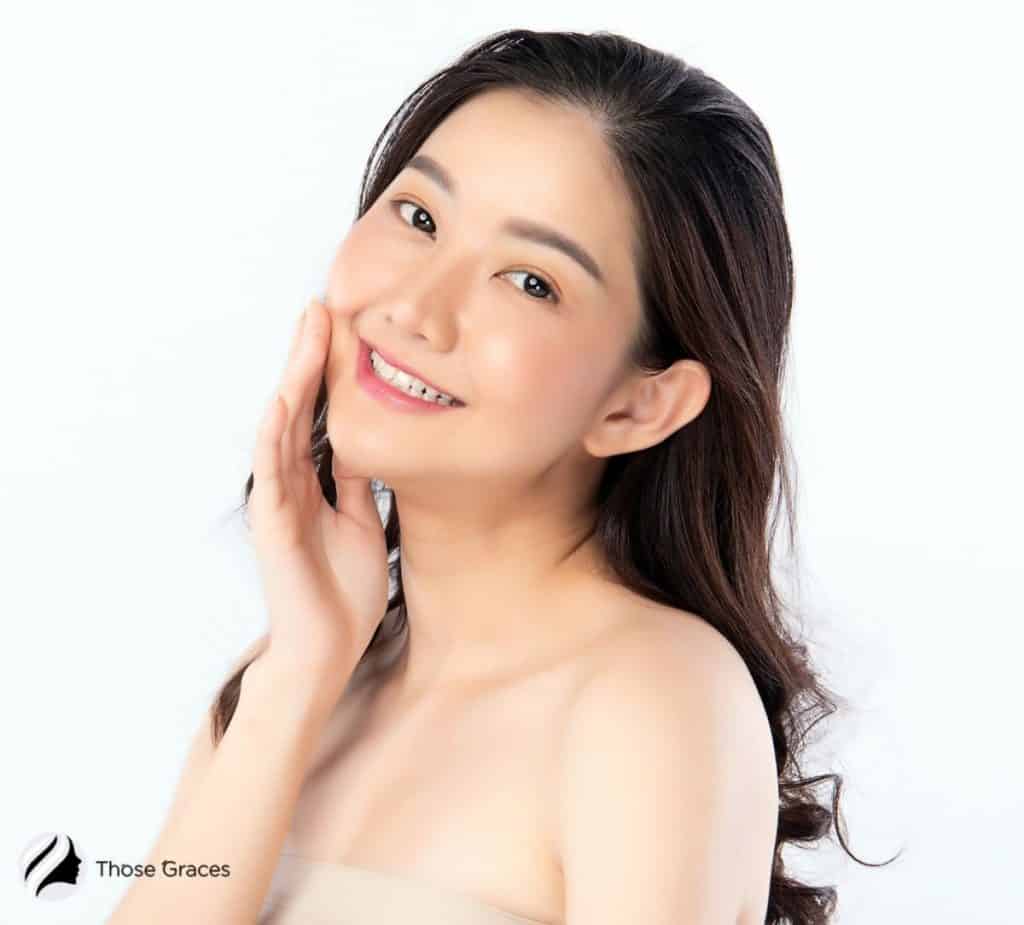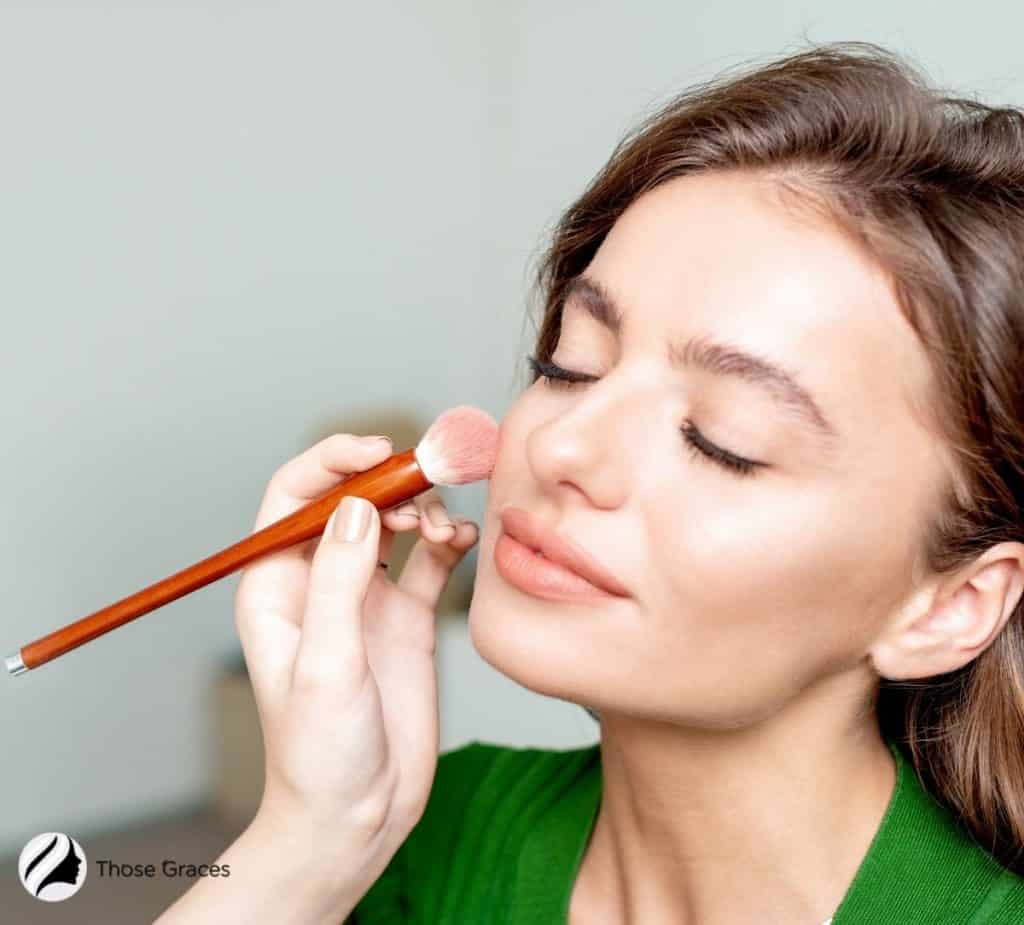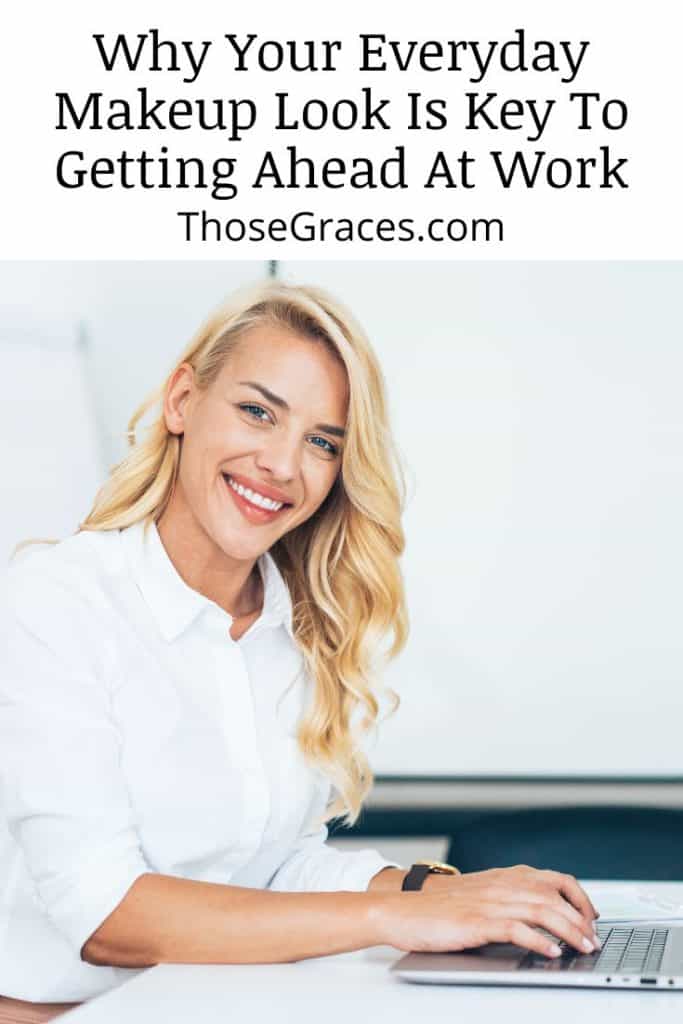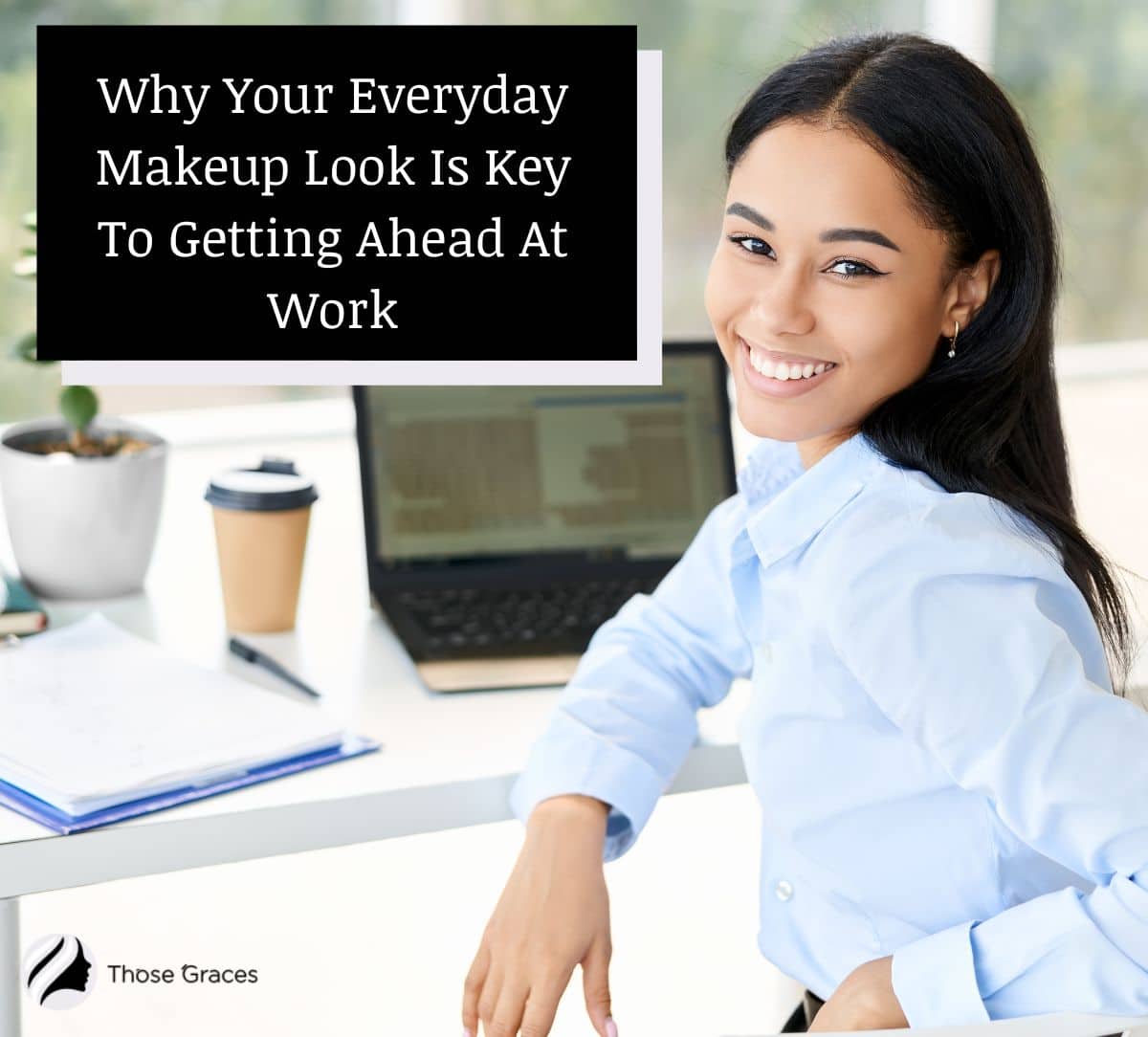Ever wondered how your every day makeup looks impact your career?
Combining the knowledge from my master’s degree in economics and my obsession with makeup – I’ve evaluated the research to find out!
You may want to know, “Does wearing makeup impact your earnings?”, “Can it influence your promotion hopes?” or “Do colleagues perceive you differently when you wear makeup?”
I answer all of these questions (and much more), plus I reveal how improving your appearance in other ways can help in the workplace!
Table of Contents
Key Takeaways
- Less is more: When it comes to everyday makeup, keep things simple and natural-looking. A minimalistic approach with just key products can enhance your features without complications.
- Proper skin care: A good skincare routine is essential for creating a smooth canvas for your makeup. Make sure to cleanse, moisturize, and protect your skin before applying makeup.
- Invest in versatile, high-quality products: High-quality products like a neutral eyeshadow palette, long-lasting lipstick, and a good foundation can save you time and money in the long run.
Introduction to the Concept of Everyday Makeup and its Purpose
Healthline says cosmetics are important to people: “Cosmetics are a part of everyday life for both men and women.” [1]
Makeup products were completely outlawed at various stages in history (at some stages, wearing makeup in certain situations was even punishable as witchcraft)!
Within the past century, makeup has been used as a screening device to keep people in and out of the workforce [2].
During WW2, cosmetics represented the importance of staying classically feminine while doing — what was considered — men’s work.
Yes, this included minor changes to skin tones and removing those pesky dark circles — all banished.
Even the All-American Girls Professional Baseball League had this.
This league, prominent during this war period, ordered its players to do something unique:
Before their matches, the players received makeup lessons from famous makeup artist Helena Rubinstein to look more ladylike!
In some sense, wearing makeup was an assurance to both men and women that although women played a more prominent role in the workplace, gender roles would continue.
Rosie The Riveter’s masculine pose, yet feminine makeup look, captures this balance that makeup provides as a method to distinguish between men and women [2].
As more and more women have entered the workforce, the debate around workplace dress and grooming standards has accelerated. Several legal battles followed:
US Legal Cases | Can Your Employer Force You To Wear Makeup?
In 2006, the Ninth US. Circuit Court of Appeals held the following [3]:
A casino could lawfully implement a separate dress and grooming policy for men and women, including the requirement for female bartenders to wear makeup [3].
More recently, gender identity has further complicated the legality of enforcing employee dress and grooming codes.
In Creed vs Family Express Corporation (2009), Creed (born male and an employee of Family Express Corporation) underwent a sexual reassignment surgery [4].
She also assumed a traditionally feminine style of dress and appearance after being hired by her employer.
Creed began to wear her hair long and started wearing makeup and nail polish [4].
She was later fired after refusing to follow the male grooming code. Male employees were forbidden from wearing jewelry or makeup at work.
The US district court ruled that punishing Creed for not embodying certain stereotypes would be illegal. However, it ruled that punishing her for not following their grooming policy was lawful [4].
Here’s a video tutorial of an everyday makeup look:
How Your Everyday Makeup Routine Impacts Your Professional Career
The way you present yourself can influence the way you are perceived.
As explored in our post on the power of the color red, even switching the color of the shirt, you’re wearing can change a person’s perception of you!
Research shows that makeup, in particular,
Many Studies Find A Positive Impact Of Wearing Makeup On Others’ Perceptions Of You At Work
Fieldman et al. (2006) found that wearing makeup can make others perceive you as more confident and competent [5].
In this study, when a woman wore makeup, she was deemed healthier and more confident than when she went bare-faced.
When it came to the workplace, a woman wearing makeup was assumed to work a more prestigious job and have a greater earning potential than when she had no makeup [5].
The study by Graham and Jouhar (1981) is one example [6].
Both men and women rated photographs of four different women (of average attractiveness) on different personality and appearance traits.
The women were rated cleaner, more feminine, tidier, and more physically attractive with makeup on than without.
They were also considered more interesting, secure, sociable, confident, poised, organized, and popular [6].
Klatt et al. (2015) conducted a study where 354 people looked at photographs of women and rated each woman’s competence level in a series of different outfit and makeup scenarios [7].
The participants rated women with makeup on (compared to no makeup), wearing pants (compared to a skirt), and jewelry (compared to no jewelry) as more competent [7].
Wearing makeup in the workplace is also associated with people assuming you are healthier and more credible (Dellinger and Williams, 1997) [8].
Wearing Makeup & Business Attire Can Influence How Competent And Confident You Personally Feel
In a study by Ogilvie and Ryan (2011), 85% of participants described their feelings when wearing makeup (in this case lipstick) as ‘very confident’ [9].
They further observed that 82% said that lipstick made them feel “really good about themselves”; and only 28% said it made them feel “attractive to the opposite sex”.2
Karl et al. (2013) asked city employees how they feel influenced by their dress [10].
Employees said they feel more authoritative and more competent when wearing formal business or business casual attire than casual clothing [10].
For more beauty tips and product recommendations, don’t miss our articles on ‘elegant classy makeup for black dress‘ and ‘best makeup organizers reviews.’
Tips for Maintaining a Natural and Polished Look
There is no research to date measuring the impact of wearing makeup on a person’s objective performance in the workplace.

However, there is some evidence that wearing makeup can improve a woman’s academic performance at college.
Building on previous research that linked greater self-esteem with better academic performance, Palumbo et al. (2017) performed the following study [11]:
The study requested 186 female undergraduate students to take a simulated examination under three different treatments [11].
Some students wore makeup, others listened to uplifting music, and the control group colored a face on paper.
Results showed that the students who wore makeup performed better on the test than those who did not wear makeup and better than those who listened to music or colored their faces.
The researchers asked the students about their moods throughout the experiment.
Wearing makeup seemed to enhance the positive mood of the students. The authors note that previous research has linked a positive mood with better academic performance.
Additionally, those that wore makeup self-reported feeling more beautiful than the other participants [11].
It’s possible that wearing cosmetics increases self-perceived beauty, which enhances self-esteem, and this self-esteem boost improves cognitive performance.
Although performance was the overwhelming criterion used to decide who should be promoted, the candidates’ physical attractiveness did come into play in certain circumstances.
When a candidate’s performance was rated mediocre, their physical attractiveness increased their likelihood of promotion.
At other times, attractiveness appears to be a benefit or a hindrance depending on your position in the company.
Heilman and Stopeck (1985) examined the impact of appearance on performance evaluations [12].
They found a beauty premium for women in non-managerial positions and a beauty penalty for women in managerial positions.
The appearance had no effect on men’s performance evaluation [12].
If you’re looking for ways how to hide dark spots on your face without makeup, make sure to also check out my article on the topic. You might find some helpful tips and tricks there!
If you’re the visual kind, feel free to check out this video on how to get used to your new makeup routine:
Do More Attractive Employees Earn More?
There’s so much research on how attractiveness impacts earnings that economics have coined the terms ‘beauty premium’ and ‘beauty penalty’.
The research coined these terms to describe the situations when more attractive people earn more or less because of their looks.
The term ‘ugliness penalty’ is used when unattractive (or very unattractive people) earn less because of their appearance.
However, it’s essential to remember that it’s challenging to attribute greater or fewer earnings to appearance with much certainty.
Mainly because many factors influence a person’s performance at work and subsequent earnings.
Many other unknown factors could drive the gap in earnings between attractive and less attractive people.
For example, results from Kanazawa and Still (2017) contradict entirely previous findings of an ugliness penalty, finding the following [13]:
Very unattractive workers earn more than unattractive employees (sometimes more than average or attractive-looking workers) [13].
The researchers found that the beauty premium disappeared when the researchers controlled for important omitted factors like intelligence, health, and personality traits [13].
Wong et al. (2016) found that more attractive men and women earn about 20% more than average, but this effect is almost entirely mediated for women when you control for good grooming [14].
Surprisingly, the effect only halved when they controlled for grooming for male workers [14].
Wilson and Eckel (2006) and Andreoni and Petrie (2008) explored the puzzle of the seemingly disappearing beauty premium via laboratory experiments [15][16].
Their results suggest that society places greater expectations on attractive people who do not always meet these expectations.
The attractive people then seem stuck up or selfish for not meeting unrealistic expectations and are punished at a higher rate than less attractive people.
A lot of academic research into this topic finds a significant beauty premium, while other studies find a beauty penalty.
Besides the strong possibility of some dodgy econometrics, it’s possible that good looks can sometimes hinder and sometimes help in the workplace!
Does Being Attractive Or Wearing Makeup Impact Tips?
While it’s difficult to estimate the impact of attractiveness on salary earnings with accuracy, it’s easy to do this:

Conduct experiments to explore whether or not wearing makeup or being more attractive influences tipping.
Lynn and Simons (2000) found more attractive waitresses earned greater (sales-adjusted) tips than less attractive waitresses, while attractiveness had no apparent impact on waiters’ tips [17].
Jacob et al. (2010) conducted an experimental study to determine whether or not waitresses’ makeup impacts customer tipping behavior [18].
Wearing makeup was associated with a significant increase in tipping behavior from male customers relative to when the same woman did not wear any makeup.
It’s not just physical attractiveness or wearing makeup that can influence your tip earnings.
Jacob et al.’s (2012) results showed that when waitresses wore an ornament in their hair (a floral barrette, a little bird, or a black currant sprig), the following was observed [19]:
The subjects received greater tips from both male and female customers than without the ornament.
Can Makeup Protect You From Ageism In The Workplace?
If you’re an older (or maybe a very young) employee, you may be concerned about ageism in the workplace.
There’s some evidence to suggest that you’re right to be concerned. But the question remains: Can makeup — even simple makeup — give you an advantage?
Avolio and Barrett (1987) found that older job applicants are rated less positively than their younger counterparts, even when both age groups have similar qualifications [20].
If you’re worried about being maltreated because of your age in the workplace, you may want to consider wearing makeup!
Russell et al. (2018) investigated whether or not wearing makeup influences our perception of a woman’s age [21].
They found that 40 and 50-year-old women looked much younger when wearing makeup, those at 30 years old looked no older or younger with makeup than without, and 20-year-old women looked older when they wore makeup.
What Makeup Look Is Best At Work?
Overall, you want to look competent, but don’t overdo the look, so you look unprofessional. Adjust your makeup to suit the occasion.
Research reveals that the heaviness of your makeup can influence how others perceive you at work.
Etcoff et al. (2011) conducted a study in which 25 White, African American, and Hispanic women (aged 20-50) were each photographed without any makeup and with 3 different makeup looks (natural, professional, and glamorous) [22].
149 adults viewed the photographs for 250 milliseconds (enough time to make a snap judgment). A further set of 119 adults received unlimited time to view the same photographs.
Overall, all participants deemed the women wearing makeup more competent than those without any makeup, no matter the time spent looking at the photograph.
However, the longer they looked at the photographs, the more they deemed women with glamorous makeup as ‘untrustworthy’.
Check out this video:
Adjusting Everyday Makeup Routine To Suit Job Role & The Gender Dynamics
Our perception of women when they wear makeup differs between the sexes.
Men view women who wear makeup as more prestigious, whereas women perceive ladies who wear makeup as more dominant (Mileva et al. 2016) [23].
The authors found some evidence that the perception of dominance was influenced by jealousy – women experience more jealousy towards women wearing cosmetics [23].
The authors later elaborated that the results of this study are essential for the labor market.
Wearing more or less makeup can influence the outcome of your job interview.
If you have an interview for a subordinate position with a primarily female staff, perhaps consider toning down your makeup look.
However, if you’re going for a job promotion, try a more robust look (a darker shade of lipstick, more eyeliner), especially when a hirer is a straight man [24].
4 Ways To Look More Attractive At Work (Beside Wearing Makeup)
You may be eager to know how to achieve a natural-looking complexion or how to apply eyeliner for a subtle daytime look. But before going for the problematic gremlins, I’ll discuss the easy ones:
1. Change Your Diet
Perhaps one of the most unusual ways you can increase your attractiveness is by…. eating carrots (or at least a beta-carotene-rich diet)!

As explored in our tanning research post, multiple studies have found that when people switch to a beta-carotene-rich diet, they are rated more attractive after the diet.
The carotenoid pigmentation in your skin influences how healthy (and therefore how attractive) people perceive you to be.
Carotenoid pigments help your skin appear slightly more yellow, and this yellow pigment may be related to our perception of tanned skin as more attractive!
2. Get A Good Night’s Sleep
Axelsson et al. (2010) investigated the impact of sleep on rated attractiveness. Participants evaluated photographs of people after a good night’s sleep and a period of sleep deprivation [25].
The sleep-deprived were rated significantly less attractive and less healthy than those who slept for longer.
3. Smile!
Otta et al. (1996) have found smiling faces are more attractive than neutral ones [26].

4. Whiten Your Teeth
Kershaw et al. (2008) found that people rate faces with discolored teeth lower on several different traits as follows [27]:
Intellectual ability, popularity, friendliness, trustworthiness, introversion, and self-confidence!
These traits, particularly intellectual ability and trustworthiness, are vital for landing that dream job.
Consider a teeth whitening kit or try the baking soda teeth whitening method to boost your confidence and give an air of intelligence and self-confidence.
FAQs
1. What are some basic steps for everyday makeup?
2. What are some tips for makeup that last all day?
3. How do I pick my makeup look?
Conclusion
Every day makeup is essential, promising nothing but a lifetime of study to its contenders, matching the ancient art of cosmetics with modern-day psychology.
From eye makeup to fluffy brushes, your every day makeup routine can be as simple as applying the right eye shadow before heading out to the local cafe.
To master your craft, you will do best by knowing about skin types:
Yellower skin (appearing as tanned) can exuberate attractiveness. Now, beauty is in the eye of the beholder, and so are different skin types for different people.
But — and I know this to be true — you have your ideal. And that’s totally fine.
With this in mind, I hope I have provided some superb tips that you can follow to bring out your natural beauty and become the person you know you’re best.
Lastly, don’t forget to share your beautiful tips and techniques with me in the comments section. I’d love to hear more from you.
Until next time…

Sources
1. the Healthline Editorial Team. Healthy Cosmetics [Internet]. Healthline. Healthline Media; 2014. Available from: https://www.healthline.com/health/beauty-skin-care-cosmetics
2. Carbado D. Makeup and Women at Work [Internet]. Researchgate.com. 2006. Available from: https://www.researchgate.net/publication/228189791_Makeup_and_Women_at_Work
3. Hicks PH, Hall VA, Westbrook DL. Reasonable Dress and Grooming Requirements Survive Court Scrutiny. Gaming Law Review. 2006;10:342–6.
4. Creed v. Family Express Corporation, CASE NO. 3:06-CV-465RM | Casetext Search + Citator [Internet]. casetext.com. 2009 [cited 2023 Jan 26]. Available from: https://casetext.com/case/creed-v-family-express-corporation
5. Nash R, Fieldman G, Hussey T, Lévêque J-L, Pineau P. Cosmetics: They Influence More Than Caucasian Female Facial Attractiveness. Journal of Applied Social Psychology. 2006;36:493–504.
6. GRAHAM JA, JOUHAR AJ. The effects of cosmetics on person perception. International Journal of Cosmetic Science. 1981;3:199–210.
7. Klatt J, Eimler SC, Krämer NC. Makeup your mind: The impact of styling on perceived competence and warmth of female leaders. The Journal of Social Psychology. 2016;156:483–97.
8. Dellinger K, Williams CL. Makeup at Work: Negotiating Appearance Rules in the Workplace. Gender and Society [Internet]. 1997 [cited 2023 Jan 26];11:151–77. Available from: https://www.jstor.org/stable/190541?seq=1#page_scan_tab_contents
9. Ogilvie M. Lipstick: More than a Fashion Trend. Tij S Research Journal of Social Science Management Rjssm [Internet]. 2011 [cited 2023 Jan 26]; Available from: https://www.academia.edu/47857334/Lipstick_More_than_a_Fashion_Trend
10. Karl KA, Hall LM, Peluchette JV. City Employee Perceptions of the Impact of Dress and Appearance. Public Personnel Management. 2013;42:452–70.
11. Palumbo R, Fairfield B, Mammarella N, Di Domenico A. Does make-up make you feel smarter? The “lipstick effect” extended to academic achievement. Walla P, editor. Cogent Psychology. 2017;4.
12. Heilman ME, Stopeck MH. Being attractive, advantage or disadvantage? Performance-based evaluations and recommended personnel actions as a function of appearance, sex, and job type. Organizational Behavior and Human Decision Processes. 1985;35:202–15.
13. Kanazawa S, Still MC. Is There Really a Beauty Premium or an Ugliness Penalty on Earnings? Journal of Business and Psychology [Internet]. 2017;33:249–62. Available from: http://personal.lse.ac.uk/Kanazawa/pdfs/JBP2018.pdf
14. Wong JS, Penner AM. Gender and the returns to attractiveness. Research in Social Stratification and Mobility. 2016;44:113–23.
15. Wilson RK, Eckel CC. Judging a Book by its Cover: Beauty and Expectations in the Trust Game. Political Research Quarterly. 2006;59:189–202.
16. Andreoni, J, Petrie R. APA PsycNet [Internet]. psycnet.apa.org. 2008 [cited 2023 Jan 26]. Available from: https://psycnet.apa.org/record/2008-01886-005
17. Lynn M, Simons T. Predictors of Male and Female Servers’ Average Tip Earnings. Journal of Applied Social Psychology [Internet]. 2000 [cited 2023 Jan 26]; Available from: https://www.semanticscholar.org/paper/Predictors-of-Male-and-Female-Servers%E2%80%99-Average-Tip-Lynn-Simons/fc3ed37a3ef3756977adaef5a4c6ff0f549dce84
18. Jacob C, Guéguen N, Boulbry G, Ardiccioni R. Waitresses’ facial cosmetics and tipping: A field experiment. International Journal of Hospitality Management. 2010;29:188–90.
19. Jacob C, Gueguen N, Delfosse C. She Wore Something in Her Hair: The Effect of Ornamentation on Tipping [Internet]. 2012. Available from: https://www.tandfonline.com/doi/abs/10.1080/19368623.2012.624296?journalCode=whmm20
20. Avolio BJ, Barrett GV. Effects of age stereotyping in a simulated interview. Psychology and Aging [Internet]. 1987 [cited 2021 Feb 7];2:56–63. Available from: https://pubmed.ncbi.nlm.nih.gov/3268193/
21. Russell R, Batres C, Courrèges S, Kaminski G, Soppelsa F, Morizot F, et al. Differential effects of makeup on perceived age. British Journal of Psychology. 2018;110:87–100.
22. Etcoff NL, Stock S, Haley LE, Vickery SA, House DM. Cosmetics as a feature of the extended human phenotype: modulation of the perception of biologically important facial signals. PloS one [Internet]. Public Library of Science; 2019;6:e25656. Available from: https://www.ncbi.nlm.nih.gov/pubmed/21991328
23. Mileva VR, Jones AL, Russell R, Little AC. Sex Differences in the Perceived Dominance and Prestige of Women With and Without Cosmetics. Perception. 2016;45:1166–83.
24. How make-up makes men admire but other women jealous [Internet]. ScienceDaily. 2016 [cited 2023 Jan 26]. Available from: https://www.sciencedaily.com/releases/2016/06/160624155151.htm
25. Axelsson J, Sundelin T, Ingre M, Van Someren EJW, Olsson A, Lekander M. Beauty sleep: experimental study on the perceived health and attractiveness of sleep deprived people. BMJ. 2010;341:c6614–4.
26. Otta E, Abrosio FFE, Hoshino RL. Reading a Smiling Face: Messages Conveyed by Various Forms of Smiling. Perceptual and Motor Skills. 1996;82:1111–21.
27. Kershaw S, Newton JT, Williams DM. The influence of tooth colour on the perceptions of personal characteristics among female dental patients: comparisons of unmodified, decayed and “whitened” teeth. British Dental Journal. 2008;204:E9–9.


